In Japan nowadays we often see the word "ikumen" in newspapers or other media. Ikumen is a newly coined word in Japanese: "iku" means "raising" and "men" is "man" in English, referring to a man who enjoys child-rearing as part of his own personal growth *1. This word has recently acquired a positive meaning that is being used to encourage young fathers to be involved in child-rearing.
The Benesse Institute for the Child Sciences and Parenting conducted research studies, in 2005 and 2009, on fathers of infants living in the Tokyo metropolitan area, focusing on the actual conditions of their child-rearing, relationship with other family members, their mindset toward child rearing, work-life balance, etc. This time, we expanded the scope of our research to other Asian countries, and conducted a survey over the Internet, making contact with fathers in four cities: i.e., Tokyo (Japan), Seoul (South Korea), Beijing (China), and Shanghai (China). The results were just published in June 2010.
Now, you will probably want to know to what degree Japanese fathers' are involved in the type of child-rearing we refer to as ikumen. Here we explain the survey results highlighting the conditions of fathers in Tokyo.
*1: Excerpt from the website of "Ikumen Project," the Ministry of Health, Labor and Welfare.
Survey Overview
The survey was conducted over the Internet of fathers who have children aged zero to five years old (pre-school ages) in four cities, receiving valid responses from 1,046 to 1,800 respondents in each city.
| Tokyo | Seoul | Beijing | Shanghai | |
| Survey period | August 2009 | March 2010 | March 2010 | March 2010 |
| Scope of survey | Fathers who have a child aged zero to five (and the first child in China) | |||
| Number of respondents | 1,602 | 1,046 | 1,800 | 1,800 |
| Breakdown of respondents by the age of their children | 0: 288 1: 270 2: 257 3: 273 4: 267 5: 247 |
0: 165 1: 171 2: 179 3: 182 4: 176 5: 173 |
0: 300 1: 300 2: 300 3: 300 4: 300 5: 300 |
0: 300 1: 300 2: 300 3: 300 4: 300 5: 300 |
| Survey area | Tokyo | Seoul and other eight cities of the Gyeonggi Province | Beijing | Shanghai |
The questionnaire items include the actual conditions of involvement in housework and child-rearing; relationship with their child, wife, grandparents, etc.; concept of child-rearing; level of anxiety toward their future as a father; the status of their work-life balance; and so on. When we designed the survey, we had asked three renowned researchers as well as Dr. Noboru Kobayashi at CRN to supervise the project.
Basic Attributes
The average age of fathers in the survey was 36.3 in Tokyo, 35.6 in Seoul, 32.2 in Beijing, and 31.9 in Shanghai. In terms of academic background, a majority (50-60%) of respondents were graduates of four-year universities in all cities. There were also some graduate degree holders (10% to less than 20%). As for current occupation, 80-90% of respondents in all cities were office workers in a permanent position. In addition, around 90% of respondents in Beijing and Shanghai belong to double-income households, while in Tokyo and Seoul, 62.9% and 52.6% of respondents have an unemployed wife, respectively.
Fathers in Tokyo spend the least time with their child on weekdays, but the longest time on weekends
In response to the question how much time they time with their child on weekdays, the high percentage of fathers answered "one hour to less than two hours" in Tokyo and Seoul, "three hours to less than four hours" in Beijing, and "two hours to less than three hours" in Shanghai. This indicates that fathers in Tokyo are likely to spend the least time with their child on weekdays, compared with those in other cities. In this survey, we also asked them the time they returned home from work on weekdays, and consequently found out that fathers in Tokyo return home the latest compared with those in other cities, which is possibly one of the reasons they spend the least time with their child.
On weekends, however, the survey shows that fathers in Tokyo spend the longest time with their child; 52.2% of respondents in Tokyo answered they spend "10 hours to almost all day" with their child.
Q: How much time do you spend with your child (subject to this survey) per day? Please answer the average time on weekdays and weekends.
Fathers in Tokyo are likely to have a lower degree of involvement in housework and child-rearing, compared with those in Beijing and Shanghai, implying that their child care efforts are concentrated into fewer hours
We conducted questionnaires regarding the involvement in housework (5 question items) and child-rearing (11 question items, except Tokyo which had 10 items), and the answers were rated on a scale of one to four. As a result, overall fathers in Tokyo and Seoul tend to show a lower degree of involvement in housework and child-rearing compared to those in Beijing and Shanghai. More fathers in Tokyo answered that they practiced child care tasks which could be concentrated into fewer hours, such as giving a child a bath, scolding or praising a child, etc. In contrast, fathers in Beijing and Shanghai, who usually return home earlier than those in Tokyo, were more involved in time-consuming tasks such as playing indoors with the child.
Furthermore, we asked them how much time they spend on hobbies, community activities, study for qualifications, etc. other than housework and child-rearing. Fathers in Tokyo and Seoul tend to show less enthusiasm for these activities compared to those in Beijing and Shanghai.
On the basis of these results, it can be said that the entire structure of our society is being challenged to find new approaches to work and family life/child rearing, so as to enable fathers in Tokyo to return home earlier on weekdays and have more time to spend with their wife and children.
Q: How much are you involved in each of the following activities?
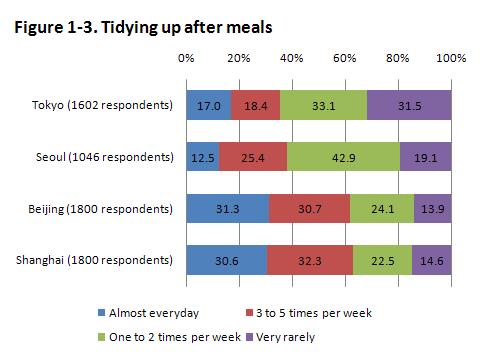
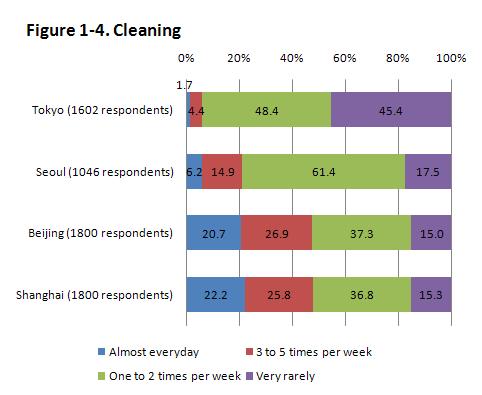
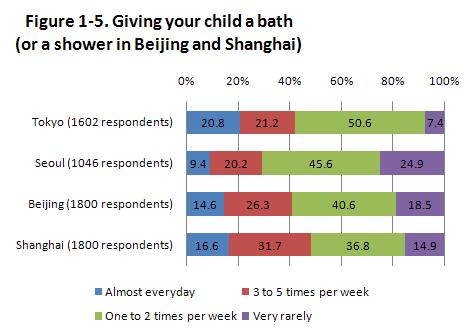
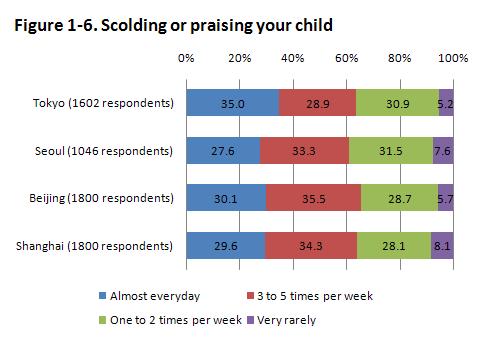
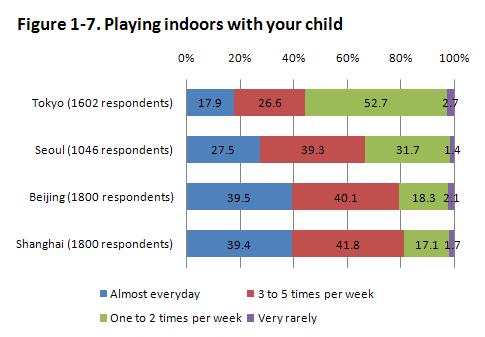
The above five activities are chosen from among five housework activities and eleven child-rearing activities (10 in Tokyo).
Left: Survey results in the area of housework
Right: Survey results in the area of child-rearing
The ideal father is "dependable" for fathers in Tokyo, while "respectable" is the top answer among those in Seoul, Beijing, and Shanghai
Next, we asked respondents to select three out of 19 items that are considered to convey the image of an ideal father. As a result, the top answer was "dependable" (66.9%) for fathers in Tokyo, followed by "respectable" (51.7%). In Seoul, Beijing, and Shanghai, the majority of fathers selected "respectable." It is noteworthy that, in Seoul, the second most popular answer was a "like a friend" with a relatively high percentage of 62.4%. In addition, in Beijing and Shanghai, "dependable" was the second highest choice. However, "knowledgeable," the third most popular quality among fathers in these two countries, was not a popular answer in Tokyo and Seoul. Therefore, we assume that the image of the ideal father may vary according to the differences in culture between countries, not only to the change of the times.
Q: Which of the following qualities best describes your image of the ideal father. Select up to three. (Figure 2-1)
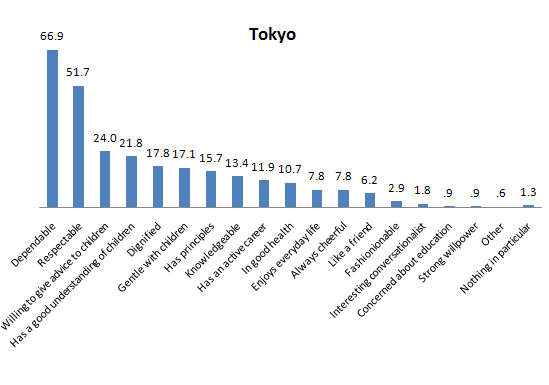
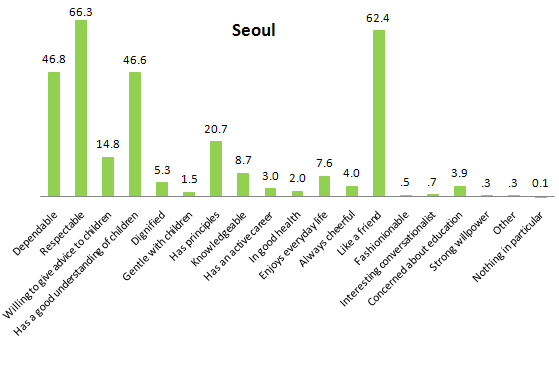
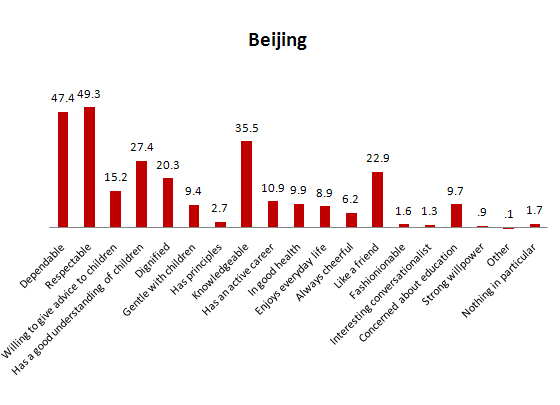
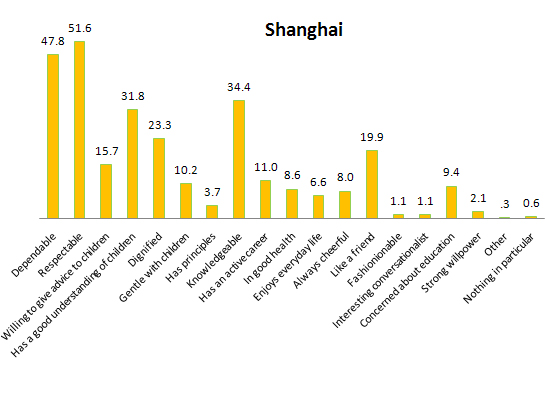
The above data are arranged in order based on the descending order of the results gathered in Tokyo.
When asked about their worries for the future, most fathers answered " high cost of child's future education," followed by "the cost of child care": both of which are economic factors chosen by more than 50% of respondents in all cities
Finally, we asked respondents to select as many as they wished from 19 reasons for their anxiety for the future. The highest and second most cited reasons concerned the cost of child care and education: this phenomenon is common to all four cities. Fathers in Seoul, in particular, showed the highest rate of anxiety, 83.9% of respondents, regarding "high cost of child's future education," The third answer for each city varied: the "possible decrease in income in the future" in Tokyo (47%), "instability of current social environment for raising a child" in Seoul (64.3%), and "child will grow up healthy and safe" in Beijing (40.7%) and in Shanghai (43.7%).
The top three answers received from fathers in Tokyo showed that they are feeling pressured and insecure about their economic future. While Japan is facing a downward trend in the birthrate, Tokyo's total fertility rate fell to 1.09 in 2008, the lowest in the country. This indicates that our society should seek solutions to ease the anxiety regarding the cost of child care and education, as well as legislative and societal reforms to improve working conditions so that fathers will be able to go home earlier from work.
Q: What worries do you have about the future? (Multiple answers) (Figure 2-2)



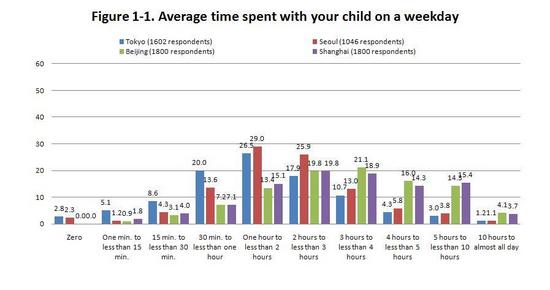
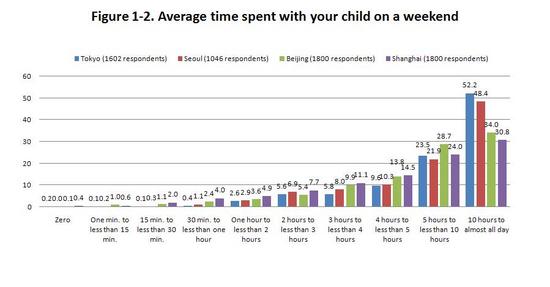
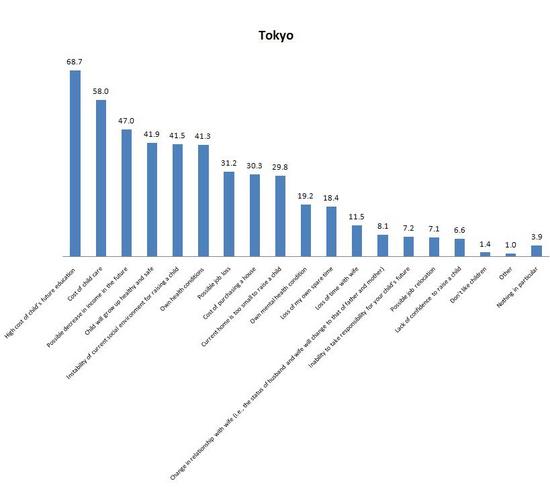 Enlarge
Enlarge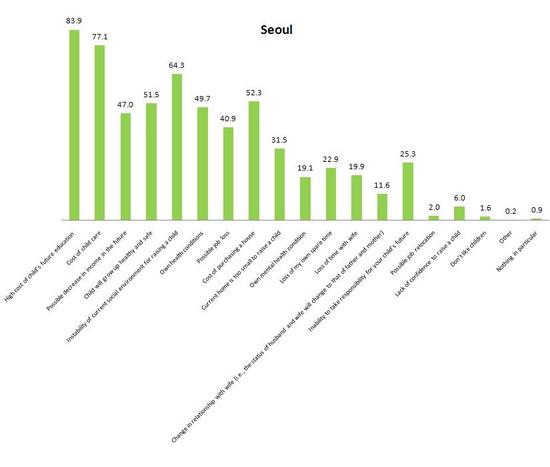 Enlarge
Enlarge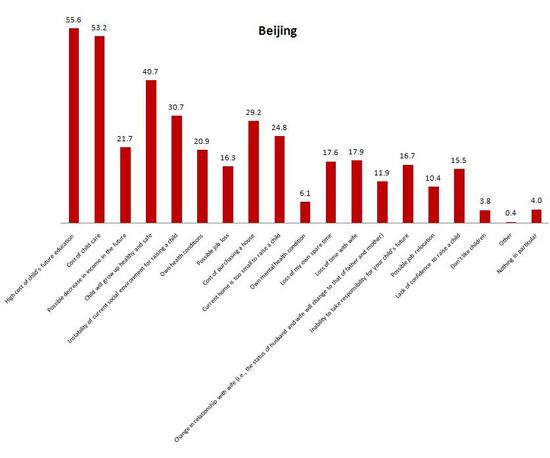 Enlarge
Enlarge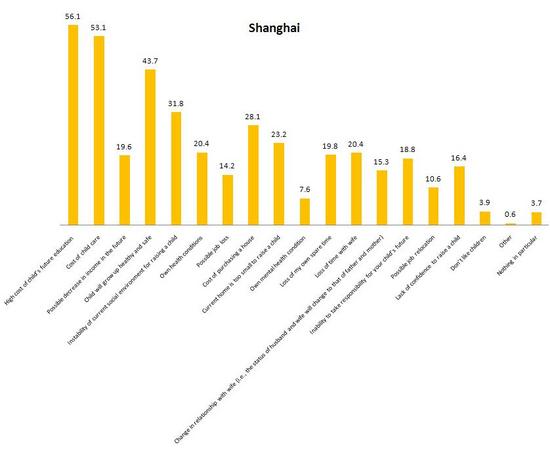 Enlarge
Enlarge










